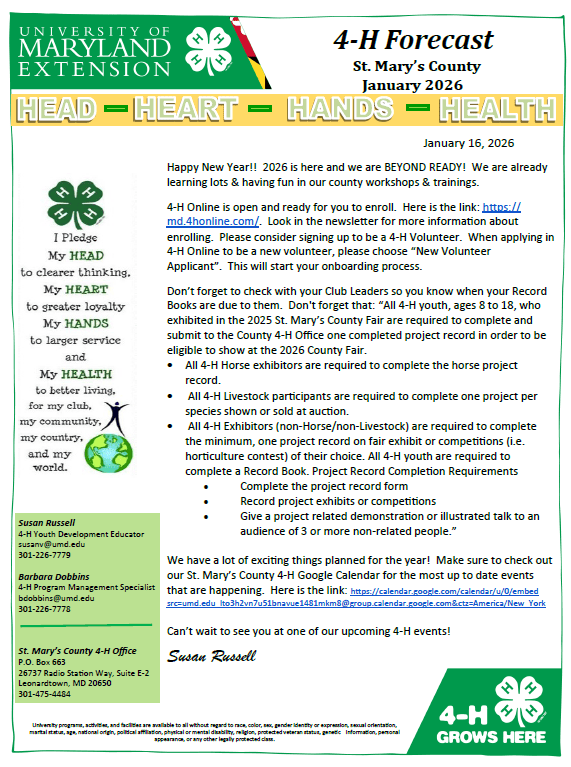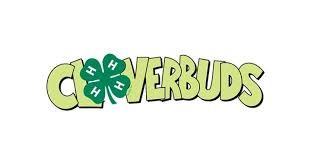Who May Belong to 4-H?
- 4-H is an educational organization for boys and girls who must be eight years of age and have not passed their 19th birthday by January 1 of the current year. It is open to all youth regardless of race, color, sex, handicap, religion, age, or national origin.
Who's in Charge of 4-H?
- 4-H is sponsored throughout Maryland by the University of Maryland Extension. Nationally, it is a part of the Extension Service in the United States Department of Agriculture. The people responsible locally are 4-H Extension Educators in the St. Mary's County Office of University of Maryland Extension, supported, in part, by the St. Mary's County Government.
Why Do Kids Like 4-H?
- They have fun with their friends--meetings, social activities, tours, camps, and fairs. They learn to do interesting things--take care of raising animals and plants, redecorate their rooms, fix a bike, take pictures. or learn to cook.
What Do the H's Stand For?
- HEAD, HEART, HANDS, AND HEALTH--4-H members pledge:
"My head to clearer thinking,
My heart to greater loyalty,
My hands to larger service and
My health to better living
for my club, my community, my country, and my world"
What is a 4-H Emblem?
- The office 4-H emblem is a green, four-leaf clover with a white "H" on each clover leaf. It is copyrighted and may be used only as approved by 4-H.
4-H CLUBS AND 4H MEETINGS
4-H How Often and When Do 4-H Clubs Meet?
- Some clubs meet every week, for a month or two, and some meet once or twice a month all year long. Many clubs meet for an hour or two after school, in the evening, or on a Saturday. It all depends on the club and what they want to do. 4-H Clubs may organize any time of the year. Sometimes members have to be enrolled in a project by a certain time to be eligible for specific activities.
Where Do 4-H Clubs Meet?
- Any place large enough which is convenient for the members of the group. Some clubs take turns meeting in member's homes. Some meet in a central place such as a school, church, or community room. Some meet at the leader's home. How Big Should a Club Be? This depends on the age of the members, the places they have to meet, and the leadership available. The ideal club is big enough to have fun together but small enough for everybody to feel a part of the group. The average 4-H club is likely to have 10 to 20 members.
Who Names the 4-H Club?
- The members of the club, with their leader's guidance, name the club.
What Do 4-H Club Members Do at Meetings?
- 4-H Club meetings usually have four parts
- Project Work
- Business
- Recreation or Social Activities
- Special Interest Programs
Do They Do all These Things At One Meeting?
- Sometimes, if they have little business to conduct, they may work on their projects and play a game or two. Sometimes the whole meeting will be devoted to one thing. (Example: Everyone will bring their dog and practice obedience, or the entire meeting may be needed to plan a club activity).
Who Plans the Program for the Club?
- The members of the club plan the program, especially if the club is small. If the club is large, ideas are given by everyone and a committee is put together to decide on a club program from the ideas.
What About Officers?
- 4-H Clubs may have officers and whatever committees they need to run their own business. 4H has materials available for Presidents, Vice-Presidents, Secretaries, Treasurers, News Reporters, and Recreation Leaders. The club may have more or less officers depending on their needs.
Do 4-H Clubs Have Dues?
- This depends on their need for money. There are no State or National 4-H dues. If the club wants money for some activity, they usually charge dues or conduct fundraising activities. These monies are for club use only. Dues should never be used to keep someone from joining 4-H.
4-H PROJECTS
What are 4-H Projects?
- 4-H Projects are learning experiences for 4-H members. Most projects are available from the University of Maryland Cooperative Extension 4-H Office. There may be a charge to the 4-H member for some areas.
What Does a 4-H Project Cost?
- The cost varies but the projects can be used over a three-year period. A member enrolled in some projects could use items from around the house. A member who buys a camera will need to invest in film for one's project. Discuss the cost with members and then select a project. It should be realistic to the family situation. Sometimes clubs find sponsors to help with project costs.
Are 4-H Members Expected to Do Their Own Project Work?
- Yes--with Help. 4-H is a "learn by doing" program. Adult leaders, junior leaders, or parents may tell or show a member how, but members are expected to learn how to do things themselves.
What is Project "Completion?"
- Completion means that the 4-H member has met the project requirements and goals he/she set when he/she enrolled in a project. Most counties provide some sort of recognition such as pins, ribbons, or monetary awards.
Do 4-H'ers Do Projects Individually or as a Group?
- Both--some projects such as fishing are more fun if done in a group. Others, such as making a dress, will be done individually by each member of the group.



